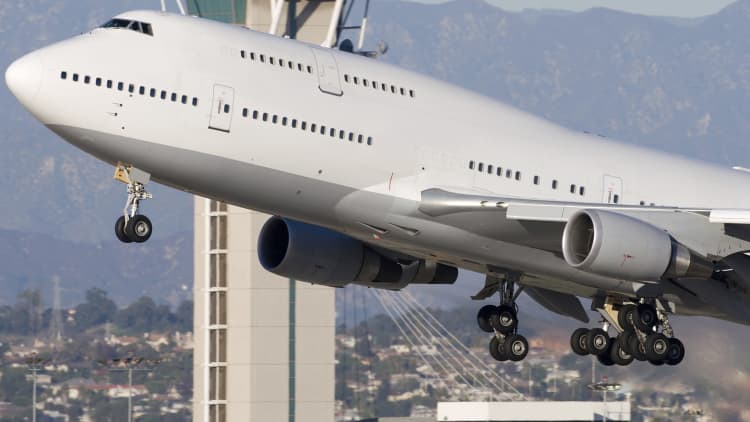It's August, and Americans sneaking in those last summer vacation days are adding a new tradition to walking on the beach, grilling burgers and relaxing in hammocks ... dreading the post-vacation pile of emails that awaits their return to work.
In fact, one new survey suggests the email avalanche is so dreadful that some workers might consider skipping vacation altogether. Other research shows many workers head off the digital disaster by letting work email invade their holidays.
Ursala Powers' tale of vacation re-entry woes is typical.
"I went on vacation for one week and came back to over 1,000 emails," she said. The depressing pile made her wonder if taking time off was worth it. "Absolutely. (There is) too much waiting for us to deal with when we return."
American workers already enjoy less paid vacation time than most of their European counterparts, and only 25 percent use all their stingy vacation-day allotment anyway, according to a Glassdoor survey.
Human resources and staffing firm Randstad US hinted at one possible reason for this twisted truth in its survey, which found that returning from vacation can be downright painful for many workers.
More than three-quarters of those who find something difficult about taking vacations said the dreaded first day back in the office was their main deterrent. Older employees were even more likely to cite first-day-back woes—a full 84 percent of Gen X'ers—said they dreaded the first day back. Workers were about half as likely to complain about a work crunch on the last day before vacation, according to Ranstand.
Christopher Ambler, a Web developer, employs a tactic that seems menacing—he just never stops reading emails, even when he's on vacation.
Read MoreTips for vacationing on a budget this summer
"I read ... but rarely reply ... to email while away. Yes, I know," he said. "But I find it better for my mental health to stay connected and know that all is well."
But Ambler's strategy is popular with many American workers. The American Psychological Association says that 44 percent of adults check email while on vacation, and an astonishing 1 in 10 check in hourly.
It's a bad idea to skip breaks. Plenty of studies show our brains need alternative periods of focused efforts followed by unstructured relaxation to work well.
"We all know this intuitively. We are not performing at our best when we are exhausted," said Anne Weisberg, senior vice president of the Families and Work Institute, which advocates for work-life balance. "The question is, 'What is the tone being set by the team leader?'"
The survey results seem to suggest many workplaces—or at least many work inboxes—are hostile to the idea of breaks. That's discouraging, said Tanya Schevitz, spokeswoman for Reboot, a San Francisco-based organization that advocates for work-life balance—and specifically, disconnecting from technology. The group organizes a "National Day of Unplugging" every year.
"It is sad that we have reached a place where people will not take a vacation because they are worried about the emails they face when they return," she said. But Schevitz is realistic about the challenges facing American workers, and generally endorsed Ambler's strategy.
"We encourage people to set achievable goals for themselves to have regular unplugged time. So if someone is worried about taking a week of vacation without checking email at all, he or she could plan to check email once a day or once every two days for 15 minutes to check for fires that need to be put out."

How to cope
Schevitz is among those who think workers themselves are at least partly to blame for all the vacation anxiety. Some of those "fires" are imagined, and will put themselves out, or can be handled by other workers, she said. Backing partly off email on this vacation might have a surprising impact on the next one, she said.
"Mostly likely, there will be no emergencies that couldn't have been dealt with upon return. Hopefully the next vacation could be completely email free," Schevitz said.
A little bit of inbox organization can help too. Frustrated by her most recent battle with a vacation inbox avalanche, Powers noted that many of the 1,000 emails she found were trivial. She looked for ways to reduce inbox traffic, and used a program called Unroll Me to help.
"After filtering through manually and unsubscribing from several accounts, I then (sorted) the stuff that I didn't need to deal with individually but could read later. I couldn't believe what a difference it made for me," she said. "I need to stop subscribing to stuff and signing online petitions. That's my lesson."
Read MoreOn the road again: RV sales picking up speed
The most important lesson of all, however, is the practical advice offered by Weisberg: Always make sure someone can cover for you, so you can take a true vacation.
"I am a big believer in developing with co-workers a spirit of reciprocity, of covering for each other," she said. It sounds simple, but it's easily forgotten: For employees to be truly free from their work, someone else has to be doing their work. "It can be really hard ... but if you come together as a group and create new rules, it creates great success stories when you do it right."
—By Bob Sullivan, special to CNBC Digital


